Leading a fast-growing tech company comes with its own set of challenges and opportunities. As a CEO or executive in the tech industry, staying ahead of the curve is crucial. One of the best ways to gain insights, refine your leadership skills, and stay inspired is through reading. The best business books offer new perspectives, practical strategies, and innovative ideas to help you navigate the complexities of the tech world.
Whether you’re looking to improve your company’s culture, innovate your business model, or simply get better at making decisions, this curated list of the 22 best business books has got you covered. From understanding the power of habits to mastering the art of effective communication, these books provide valuable lessons that can help you and your company thrive in a competitive landscape. Dive in, and discover the knowledge that can drive your success.
22 of the Best Business Books Every Tech Executive Should Read
“The Infinite Game” by Simon Sinek
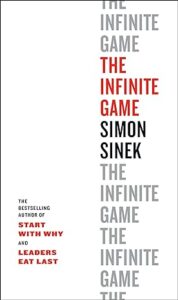 “The Infinite Game” by Simon Sinek teaches us to view life and business as a never-ending journey. According to the author, instead of aiming to win, we should focus on having a clear purpose, building strong teams, and making decisions that help us grow over the long term. The book’s takeaway is that by embracing an infinite mindset, we can handle challenges better, inspire others, and create lasting success.
“The Infinite Game” by Simon Sinek teaches us to view life and business as a never-ending journey. According to the author, instead of aiming to win, we should focus on having a clear purpose, building strong teams, and making decisions that help us grow over the long term. The book’s takeaway is that by embracing an infinite mindset, we can handle challenges better, inspire others, and create lasting success.
Buy on Bookshop.org and support your local bookshop
Buy on Amazon
“I found “The Infinite Game” by Simon Sinek an enlightening read. The concept of adopting an infinite mindset resonated with me. In today’s fast-paced world, it’s easy to get caught up in the race to win, often at the expense of long-term growth. Sinek’s insights remind us that success lies in building trust, cooperation, and resilience. By shifting focus from short-term wins to enduring progress, we can create a sustainable and thriving ecosystem for our organizations and communities.”
Eric Marshall, Founder / Co-Founder at Level Up Development, EchoTech.ai and Agent700.ai
“What Got You Here Won’t Get You There: How Successful People Become Even More Successful” by Marshall Goldsmith
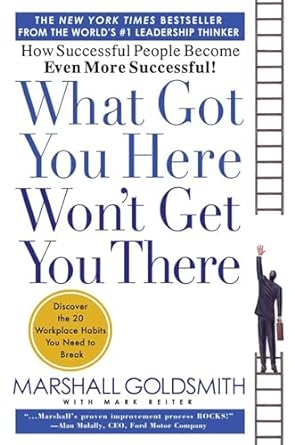 “What Got You Here Won’t Get You There” by Marshall Goldsmith is all about getting better and growing. The author says that the stuff that made you successful before might not work for the next step. He thinks it’s super important to spot and change these habits to keep moving forward. The big idea is that to keep succeeding, we need to adapt, learn new things, and keep improving how we act.
“What Got You Here Won’t Get You There” by Marshall Goldsmith is all about getting better and growing. The author says that the stuff that made you successful before might not work for the next step. He thinks it’s super important to spot and change these habits to keep moving forward. The big idea is that to keep succeeding, we need to adapt, learn new things, and keep improving how we act.
Buy on Bookshop.org and support your local bookshop
“My favorite business book is “What Got You Here Won’t Get You There: How Successful People Become Even More Successful” by Marshall Goldsmith (who holds degrees from Rose-Hulman & IU’s Kelly School of Business). It was revelatory to discover that behaviors matter more than skills when it comes to career progression. He offers actionable advice to help you “get unstuck” as you make your career climb. And he reveals 20 habits that hold successful people back from the next level.”
Karen Mangia, President & Chief Strategy Officer at The Engineered Innovation Group
“Switch: How to Change Things When Change Is Hard” by Chip Heath and Dan Heath
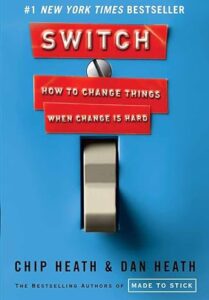 “Switch: How to Change Things When Change Is Hard” by Chip Heath and Dan Heath is all about making change easier. The authors explain that change is tough because our brains have two sides: the rational side and the emotional side. They talk about how important it is to get both sides on board to make change happen. The big takeaway is that by directing the rational side, motivating the emotional side, and shaping the path, we can make hard changes a lot easier.
“Switch: How to Change Things When Change Is Hard” by Chip Heath and Dan Heath is all about making change easier. The authors explain that change is tough because our brains have two sides: the rational side and the emotional side. They talk about how important it is to get both sides on board to make change happen. The big takeaway is that by directing the rational side, motivating the emotional side, and shaping the path, we can make hard changes a lot easier.
Buy on Bookshop and support your local bookshop
“One of my favorite books is “Switch: How to Change Things When Change Is Hard” – the biggest takeaway is the section about the Elephant and the Rider taken from “The Happiness Hypothesis”. When I work with people around me and want to embrace the change, I look first and foremost at their emotional angle (the elephant) so I can help them direct their rational thinking (the rider) in a more efficient fashion. It’s much easier to get people to embrace change if you spend time on understanding why they have a hard time changing and make them accept it instead of fighting their elephants.”
Jesper Kehlet, CEO at CuroGens
“Dare to Lead: Dare to Lead: Brave Work. Tough Conversations. Whole Hearts” by Brené Brown
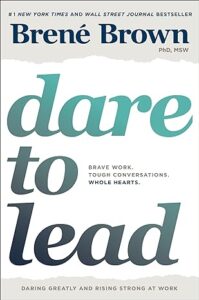 “Dare to Lead” by Brené Brown is all about being a better leader by being brave and real. The author says that real leadership means being courageous, having hard talks, and leading with empathy. The main idea is that if we dare to be vulnerable and show up with our whole hearts, we can inspire and empower others to do the same.
“Dare to Lead” by Brené Brown is all about being a better leader by being brave and real. The author says that real leadership means being courageous, having hard talks, and leading with empathy. The main idea is that if we dare to be vulnerable and show up with our whole hearts, we can inspire and empower others to do the same.
Buy on Bookshop and support your local bookshop
“Dare to Lead, we must embrace vulnerability and have tough conversations when necessary!”
Doug Booth, CEO at Multiply
“Radical Candor,” by Kim Scott
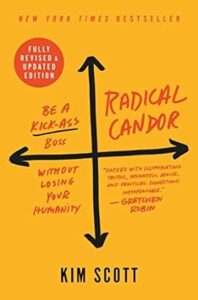 “Radical Candor” by Kim Scott is about getting better at work by being both kind and straightforward. The author says it’s important to show you care about people while also being honest with them. The main idea is that by mixing empathy with honesty, you can build trust and improve how your team works together.
“Radical Candor” by Kim Scott is about getting better at work by being both kind and straightforward. The author says it’s important to show you care about people while also being honest with them. The main idea is that by mixing empathy with honesty, you can build trust and improve how your team works together.
Buy on Bookshop and support your local bookshop
Building a team with a healthy culture where everyone has equal opportunity to realize his, her or their full potential is of utmost importance to me as a leader. That’s why I highly recommend Radical Candor written by former Apple and Google executive Kim Malone Scott. The book shares actionable strategies to be a great coach and a great leader, how to have tough conversations without being harsh, and how to balance accountability with autonomy.
Kavitha Kamal, Director of Engineering at The Engineered Innovation Group
“Essentialism: The Disciplined Pursuit of Less” by Greg McKeown
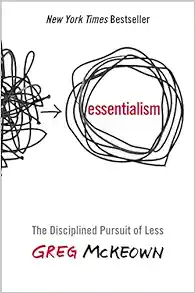 “Essentialism” by Greg McKeown is all about focusing on what really matters. The author says that by getting rid of non-essential tasks and distractions, we can make a bigger impact. The main idea is that by prioritizing the important things and saying no to the rest, we can do better work and live a more satisfying life.
“Essentialism” by Greg McKeown is all about focusing on what really matters. The author says that by getting rid of non-essential tasks and distractions, we can make a bigger impact. The main idea is that by prioritizing the important things and saying no to the rest, we can do better work and live a more satisfying life.
Buy on Bookshop and support your local bookshop
Essentialism by Greg McKeown is my biz Bible! It’s all about saying ‘no’ to noise, making killer choices, and focusing on what truly rocks. Quality beats quantity every time. It’s like a secret weapon for nailing what matters in business.
Dan Katt, VP of Sales at Trava
“Supercommunicators: How to Unlock the Secret Language of Connection” by Charles Duhigg
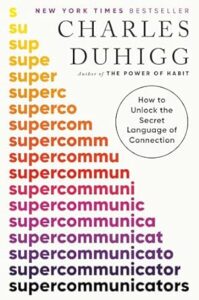 “Supercommunicators” by Charles Duhigg is all about getting better at connecting with people. The author shares tips and habits for improving communication. The main idea is that by mastering these skills, we can build stronger and more meaningful relationships in our personal and work lives.
“Supercommunicators” by Charles Duhigg is all about getting better at connecting with people. The author shares tips and habits for improving communication. The main idea is that by mastering these skills, we can build stronger and more meaningful relationships in our personal and work lives.
Buy on Bookshop and support your local bookshop
Supercommunicators has been an influential book for me. It offers actionable strategies for communicating effectively with diverse individuals and emphasizes the importance of emotional intelligence and strong communication skills in building personal and professional relationships.
The book has helped me understand how to interpret non-verbal cues, engage in storytelling, and empathize with others to create meaningful connections. The SCARF model (Status, Certainty, Autonomy, Relatedness, and Fairness) is an invaluable framework for navigating complex social situations and fostering positive interactions with the people around me. It’s a must-read or listen, as in my case 🙂
Eric Marshall, CEO at Conceptzure, Level Up Development, EchoTech.ai and Agent700.ai
“The SaaS Playbook” by Rob Walling and “Running Lean” by Ash Maurya
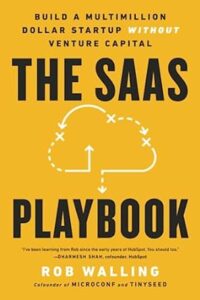 “The SaaS Playbook” by Rob Walling is a helpful guide for starting and growing a successful SaaS business. The author gives practical advice and strategies from his own experiences. The main idea is that by focusing on what customers need, running things smoothly, and always making your product better, you can build a successful SaaS company.
“The SaaS Playbook” by Rob Walling is a helpful guide for starting and growing a successful SaaS business. The author gives practical advice and strategies from his own experiences. The main idea is that by focusing on what customers need, running things smoothly, and always making your product better, you can build a successful SaaS company.
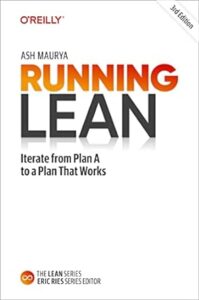 “Running Lean” by Ash Maurya is a book about creating successful products by using a lean startup approach. The author provides a step-by-step guide on how to test your ideas quickly and efficiently. The key takeaway is that by validating your ideas through experiments, focusing on solving real problems, and learning from customer feedback, you can build products that people truly want.
“Running Lean” by Ash Maurya is a book about creating successful products by using a lean startup approach. The author provides a step-by-step guide on how to test your ideas quickly and efficiently. The key takeaway is that by validating your ideas through experiments, focusing on solving real problems, and learning from customer feedback, you can build products that people truly want.
Buy on Bookshop and support your local bookshop
Two books I have really enjoyed are the SaaS playbook by Rob Walling, and Running Lean by Ash Maurya. The SaaS playbook does a great job of outlining building and scaling a SaaS business and Running Lean does a great job creating a step by step guide on finding product market fit. Both very important steps in the journey to achieve scale!
Dipen Mehta, COO at INVST
“The E-Myth Revisited: Why Most Small Businesses Don’t Work and What to Do About It” by Michael Gerber
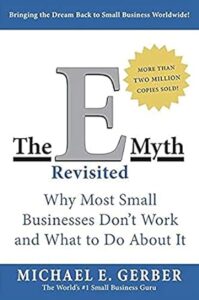 “The E-Myth Revisited” by Michael Gerber explains why many small businesses fail and how to fix it. The author says that having technical skills isn’t enough; you also need a clear vision and good systems. The main idea is that by thinking like an entrepreneur, setting up your business with effective systems, and focusing on growth, you can create a successful and lasting business.
“The E-Myth Revisited” by Michael Gerber explains why many small businesses fail and how to fix it. The author says that having technical skills isn’t enough; you also need a clear vision and good systems. The main idea is that by thinking like an entrepreneur, setting up your business with effective systems, and focusing on growth, you can create a successful and lasting business.
Buy on Bookshop and support your local bookshop
For business, I love E-myth Revisited. It has helped shape my approach in many ways! E-myth points out that successful businesses do three things well. They innovate, measure, and orchestrate (everyone marching in the same direction in the same way…). As our business grows and we get further from day to day, we must ensure we don’t lose sight of these focuses and our ability to do each.
Tim Conder, CEO at CXology
 My favorite has got to be The E-Myth Revisited by Michael E. Gerber. It’s like the bible for entrepreneurs, especially for someone like me who jumped from being hands-on in my dad’s handyman business to running my own gig.
My favorite has got to be The E-Myth Revisited by Michael E. Gerber. It’s like the bible for entrepreneurs, especially for someone like me who jumped from being hands-on in my dad’s handyman business to running my own gig.
The biggest takeaway? The profound realization that being good at a trade doesn’t automatically make you good at running a business that does that trade. Gerber talks about the myth of the entrepreneur—how many small businesses are started by people with technical skills but who lack the business-running chops. It hit me like a ton of bricks.
I learned the importance of working on my business, not just in it. It’s easy to get caught up in the day-to-day, losing sight of the bigger picture. Implementing systems and processes to ensure the business can operate without me being hands-on all the time was a game-changer. It’s like teaching your kids to ride a bike; eventually, you have to let go and watch them pedal on their own. That book taught me how to let go.
Andrew Jenkins, Owner, Catalyst RVA Marketing Agency
“The Subtle Art of Not Giving a F*ck: A Counterintuitive Approach to Living a Good Life” by Mark Manson
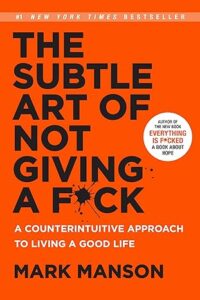 “The Subtle Art of Not Giving a F*ck” by Mark Manson is about focusing on what really matters. The author says we shouldn’t always try to be positive but should accept our limitations and life’s realities. The main idea is that by choosing what to care about and letting go of the rest, we can live a more meaningful and satisfying life.
“The Subtle Art of Not Giving a F*ck” by Mark Manson is about focusing on what really matters. The author says we shouldn’t always try to be positive but should accept our limitations and life’s realities. The main idea is that by choosing what to care about and letting go of the rest, we can live a more meaningful and satisfying life.
Buy on Bookshop and support your local bookshop
I love The Subtle Art of Not Giving a F*ck for anyone in a challenging job or early in their career.
The book helps you see that the things that stress you or create anxiety in your professional life are typically not in your control. We shouldn’t get worried about things we can’t control, and that energy is better put into things we can control. We can control, how we react, how we prepare, become better, collaborate with others and learn to be persuasive with what is important to us.
Tim Conder, CEO at CXology
“The Effective Executive: The Definitive Guide to Getting the Right Things Done” by Peter Drucker
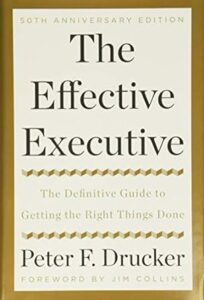 “The Effective Executive” by Peter Drucker is a book about how to be more productive and effective in your work. The author highlights the importance of managing your time, focusing on results, and making good decisions. The key takeaway is that by prioritizing tasks, delegating wisely, and continually learning, you can become a more effective leader and achieve better outcomes.
“The Effective Executive” by Peter Drucker is a book about how to be more productive and effective in your work. The author highlights the importance of managing your time, focusing on results, and making good decisions. The key takeaway is that by prioritizing tasks, delegating wisely, and continually learning, you can become a more effective leader and achieve better outcomes.
Buy on Bookshop and support your local bookshop
The Effective Executive by Peter Drucker changed the way I operate. This guide on self-management is written by the founder of modern management. He has 60+ years of insight and 39 books to his name, so he’s the real deal.
My biggest breakthrough with this book came from tracking my time. Here’s the exercise:
Jot down everything you do and how long it takes, for 3-4 weeks, twice a year. No fancy tools needed, but apps like RescueTime can be a game-changer. If you’re like me and are surprised by how little you actually focus, revise your schedule after each log. Make this a practice, because without constant tweaks, old habits creep back in. Make productivity your norm, not the exception.
Matt Hunckler, CEO at Powderkeg
“Design Your Day: Be More Productive, Set Better Goals, and Live Life On Purpose” by Claire Diaz-Ortiz
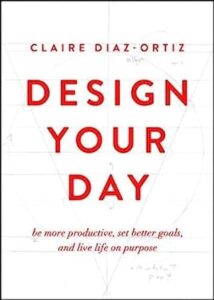 “Design Your Day” by Claire Diaz-Ortiz is a book about creating a daily routine that helps you achieve your goals and live a more intentional life. The author provides practical tips on setting priorities, managing time, and staying focused. The key takeaway is that by designing your day thoughtfully, you can be more productive, achieve your goals, and lead a purposeful life.
“Design Your Day” by Claire Diaz-Ortiz is a book about creating a daily routine that helps you achieve your goals and live a more intentional life. The author provides practical tips on setting priorities, managing time, and staying focused. The key takeaway is that by designing your day thoughtfully, you can be more productive, achieve your goals, and lead a purposeful life.
One book that’s influenced me is “Design Your Day” by Claire Diaz-Ortiz, who is now an angel investor and was an early team member at Twitter. It’s a fresh take on personal productivity and goal setting, done with intention and staying within your personal values and priorities. The book is really short, written in a friendly voice, and an easy read.
Meg Yothment, Head of Community Operations at Powderkeg
“Thinking in Systems: A Primer” by Donella H. Meadows
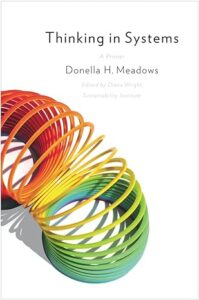 “Thinking in Systems: A Primer” by Donella H. Meadows helps you understand and analyze complex systems. The author explains how different parts of a system interact and affect each other. The main idea is that by thinking in systems, we can understand problems better, make smarter decisions, and find more effective solutions.
“Thinking in Systems: A Primer” by Donella H. Meadows helps you understand and analyze complex systems. The author explains how different parts of a system interact and affect each other. The main idea is that by thinking in systems, we can understand problems better, make smarter decisions, and find more effective solutions.
Buy on Bookshop and support your local bookshop
One of my favorite lesser-known yet profoundly insightful business books is Thinking in Systems: A Primer by Donella H. Meadows. It delves into systems thinking, offering a comprehensive framework to understand complex interrelationships in businesses and beyond. Meadows elucidates how systems behave, emphasizing the importance of feedback loops, emergence, and resilience.
My biggest takeaway from the book is the concept of leverage points—places within a system where a small change can lead to significant shifts. Understanding these leverage points equips business leaders with the ability to identify strategic interventions for systemic improvement rather than merely addressing symptoms.
Daniel Lewis, CEO, LegalOn Technologies
“Failing Forward” By John C. Maxwell
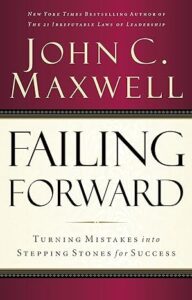 “Failing Forward” by John C. Maxwell is all about using mistakes and failures to grow and succeed. The author highlights that failure is a normal part of life and should be viewed as a learning opportunity. The main idea is that by learning from our failures, staying positive, and pushing through challenges, we can reach our goals and become stronger.
“Failing Forward” by John C. Maxwell is all about using mistakes and failures to grow and succeed. The author highlights that failure is a normal part of life and should be viewed as a learning opportunity. The main idea is that by learning from our failures, staying positive, and pushing through challenges, we can reach our goals and become stronger.
Buy on Bookshop and support your local bookshop
One of my favorite business books is definitely Failing Forward by John C. Maxwell. The biggest takeaway for me was how important it is to change your perspective on failure. Most people see failure as a roadblock that defines you as a failure, but Maxwell teaches you to view it as a stepping-stone and a learning experience that you can use to build upon.
This mindset shift is crucial for success. It allows you to take risks, learn from mistakes, and bounce back from setbacks with even more determination. The only way you can actually fail is by quitting.
Juliet Dreamhunter, Founder & AI Strategist, Juliety
“Good to Great: Why Some Companies Make the Leap…And Others Don’t” by Jim Collins
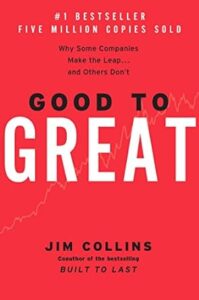 “Good to Great: Why Some Companies Make the Leap…And Others Don’t” by Jim Collins is a book about how companies transition from being good to becoming truly great. The author and his research team identify key factors that contribute to this transformation, such as disciplined people, disciplined thought, and disciplined action. The key takeaway is that with the right leadership, focus, and commitment to excellence, companies can achieve and sustain greatness.
“Good to Great: Why Some Companies Make the Leap…And Others Don’t” by Jim Collins is a book about how companies transition from being good to becoming truly great. The author and his research team identify key factors that contribute to this transformation, such as disciplined people, disciplined thought, and disciplined action. The key takeaway is that with the right leadership, focus, and commitment to excellence, companies can achieve and sustain greatness.
Buy on Bookshop and support your local bookshop
One of my favorite business books is Good to Great by Jim Collins. The biggest takeaway from this book is the concept of the ‘Hedgehog Concept,’ which emphasizes the importance of focusing on what you can be the best in the world at, what you are deeply passionate about, and what drives your economic engine. This simple yet profound idea resonated with me deeply as it emphasizes the importance of clarity, discipline, and alignment in achieving sustainable success in business.
Implementing the Hedgehog Concept requires introspection, strategic planning, and a commitment to excellence in your chosen field. By identifying your core strengths, passions, and economic drivers, you can develop a clear vision and strategy that guides your decisions and actions. This concept reminds me to stay true to our strengths and values as a business, continuously strive for excellence, and focus on what truly matters for long-term success.
Ben Davis, CEO, The Gents Place
“Built to Last: Successful Habits of Visionary Companies” by Jim Collins and Jerry I. Porras
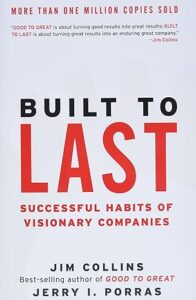 “Built to Last: Successful Habits of Visionary Companies” by Jim Collins and Jerry I. Porras is a book about what makes some companies thrive for a long time. The authors studied successful companies to identify the habits and principles that contribute to their longevity and success. The key takeaway is that visionary companies have strong core values, a clear purpose, and a commitment to continuous improvement, which help them endure and prosper over time.
“Built to Last: Successful Habits of Visionary Companies” by Jim Collins and Jerry I. Porras is a book about what makes some companies thrive for a long time. The authors studied successful companies to identify the habits and principles that contribute to their longevity and success. The key takeaway is that visionary companies have strong core values, a clear purpose, and a commitment to continuous improvement, which help them endure and prosper over time.
Buy on Bookshop and support your local bookshop
Built to Last by Jim Collins and Jerry I. Porras profoundly shaped my understanding of what makes companies endure and thrive over the long term. The book’s thorough analysis of visionary companies taught me the importance of having core values and a core purpose beyond just making money.
My biggest takeaway was the concept of “preserving the core while stimulating progress,” which has guided how I approach change and innovation within my organization. It’s prompted me to balance respect for our foundational principles with the pursuit of new opportunities, ensuring sustainability and relevance in a rapidly evolving business landscape.
Stephan Baldwin, Founder, Assisted Living Center
“Delivering Happiness” by Tony Hsieh
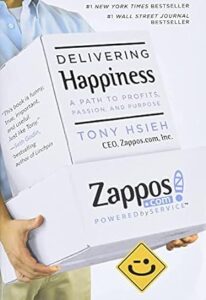 “Delivering Happiness” by Tony Hsieh is about building a great business by making customers and employees happy. The author shares his experience with Zappos, showing how focusing on employee satisfaction and excellent customer service helped the company thrive. The main idea is that a positive workplace leads to happy customers and long-term success.
“Delivering Happiness” by Tony Hsieh is about building a great business by making customers and employees happy. The author shares his experience with Zappos, showing how focusing on employee satisfaction and excellent customer service helped the company thrive. The main idea is that a positive workplace leads to happy customers and long-term success.
Buy on Bookshop and support your local bookshop
My favorite business book is Delivering Happiness by Tony Hsieh. The biggest takeaway for me was the emphasis on company culture as the foundation for delivering true customer satisfaction and business success. This principle resonated deeply with my 20 years of experience in customer service and leading my company, OneStop Northeast LLC.
In applying this to my own business, focusing on cultivating a strong, positive company culture has been crucial. For instance, we’ve integrated this philosophy into our service offerings, treating each engagement as more than a transaction but as an opportunity to foster lasting relationships. This approach has not only improved customer loyalty but has also enhanced our team’s morale and dedication, which in turn, drives better results for our clients.
Another practical application was in the context of our branding and web design services. Inspired by Hsieh’s insights, we prioritize understanding our clients’ unique cultures and values to inform our branding strategies. This ensures that the brands we develop authentically represent each company’s identity, attracting their ideal customers. This cultural alignment between our services and our clients’ goals has been a key factor in our sustained success and growth.
Dylan Cleppe, Co-Founder & CEO, OneStop Northwest LLC
“Atomic Habits” by James Clear
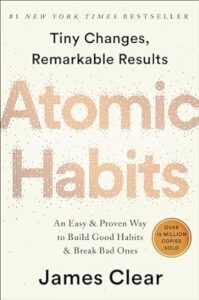 “Atomic Habits” by James Clear is about making tiny changes for big results. The author shows how small habits, practiced consistently, can lead to major improvements. The main idea is that by focusing on little, manageable changes and building good habits over time, we can transform our lives and achieve our goals.
“Atomic Habits” by James Clear is about making tiny changes for big results. The author shows how small habits, practiced consistently, can lead to major improvements. The main idea is that by focusing on little, manageable changes and building good habits over time, we can transform our lives and achieve our goals.
Buy on Bookshop and support your local bookshop
My favorite business book is Atomic Habits by James Clear. The biggest takeaway for me was understanding why humans are inherently habitual creatures and how leveraging this trait through the development of small, consistent, healthy, and productive habits can lead to massive success in business. Clear articulates that it’s not the grand, sweeping changes but rather the small, incremental adjustments to our daily routines that compound over time to yield significant results. This insight has profoundly impacted my approach to business. I’ve learned that success doesn’t necessarily come from making a few large, correct decisions but from the sum of many small habits that steer you in the right direction every day. By focusing on improving just 1% every day, I’ve been able to create a powerful ripple effect in my business operations, leading to sustainable growth and improvement. This principle of consistency and the power of habits have become the cornerstone of my business strategy, guiding me to focus on what truly matters in the long run.
Jason Vaught, President, Houston SEO Company
“The Power of Habit” by Charles Duhigg
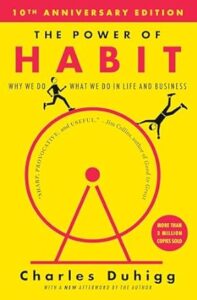 “The Power of Habit” by Charles Duhigg is a book about understanding and changing habits to improve our lives. The author explains how habits work and the science behind them, focusing on the habit loop of cue, routine, and reward. The key takeaway is that by identifying and altering the components of our habits, we can create positive changes in our behavior and achieve our goals.
“The Power of Habit” by Charles Duhigg is a book about understanding and changing habits to improve our lives. The author explains how habits work and the science behind them, focusing on the habit loop of cue, routine, and reward. The key takeaway is that by identifying and altering the components of our habits, we can create positive changes in our behavior and achieve our goals.
Buy on Bookshop and support your local bookshop
My favorite business book, The Power of Habit by Charles Duhigg, profoundly altered my perspective on habit formation and its impact on both personal and professional success. The book’s central thesis—that small, seemingly insignificant habits can trigger widespread changes—resonated deeply with me.
The most striking takeaway was learning about ‘keystone habits.’ These are habits that, once altered, can set off a chain reaction, affecting multiple aspects of one’s life and work. This insight has been instrumental in approaching both personal development and organizational culture at Bright Sprouts. By focusing on key behaviors, we can foster a more productive, positive, and innovative environment for our team and the communities we serve.
Meg Tibayan, Co-founder, Bright Sprouts
“The Lean Startup” by Eric Ries
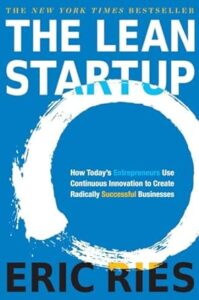 “The Lean Startup” by Eric Ries is a book about building businesses and products more efficiently. The author introduces the concept of using continuous innovation and validated learning to develop successful startups. The key takeaway is that by testing ideas quickly, gathering feedback, and iterating based on what you learn, you can create products that better meet customer needs and reduce the risk of failure.
“The Lean Startup” by Eric Ries is a book about building businesses and products more efficiently. The author introduces the concept of using continuous innovation and validated learning to develop successful startups. The key takeaway is that by testing ideas quickly, gathering feedback, and iterating based on what you learn, you can create products that better meet customer needs and reduce the risk of failure.
Buy on Bookshop and support your local bookshop
As an entrepreneur, my biggest takeaway from The Lean Startup was the importance of experimentation and continuous improvement. Ries emphasizes the concept of a Minimum Viable Product (MVP), where a product is launched with only the most essential features and then improved based on customer feedback. This approach allows businesses to avoid wasting time and resources on building a product that may not meet market demand. It also encourages a mindset of constant learning and adapting, which is crucial for success in today’s fast-paced business world. Overall, this book taught me the value of being agile and constantly testing and refining ideas to create a successful and sustainable business.
Ryan Nelson, Founder, RentalRealEstate
“Blue Ocean Strategy: How to Create Uncontested Market Space and Make the Competition Irrelevant Hardcover” by W. Chan Kim and Renée Mauborgne
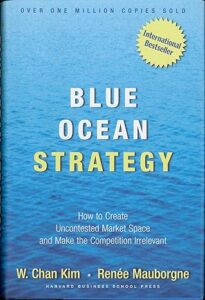 “Blue Ocean Strategy” by W. Chan Kim and Renée Mauborgne is about finding new, uncontested markets to make competition irrelevant. The authors show how to create “blue oceans” by offering something unique. The main idea is that by innovating and creating new market space, businesses can succeed without fighting over existing markets.
“Blue Ocean Strategy” by W. Chan Kim and Renée Mauborgne is about finding new, uncontested markets to make competition irrelevant. The authors show how to create “blue oceans” by offering something unique. The main idea is that by innovating and creating new market space, businesses can succeed without fighting over existing markets.
Buy on Bookshop and support your local bookshop
My go-to business book has always been Blue Ocean Strategy. The biggest takeaway for me was the concept of creating new market spaces, or ‘blue oceans.’ This idea radically shifted how I approached my outdoor gym equipment business. Initially, we were duking it out in a ‘red ocean’ of fierce competition, constantly trying to outdo others with similar products. Inspired by the book, I pivoted towards designing innovative equipment that promoted outdoor fitness in unique environments—parks, beaches, and community spaces—effectively creating our own market niche. This strategy distinguished us from competitors and sparked a renewed enthusiasm within my team, as we were no longer just another option but the go-to for outdoor fitness solutions.
Lucas Riphagen, Co-owner, TriActiveUSA
“Platform Revolution” by Geoffrey G. Parker, Marshall W. Van Alstyne, and Sangeet Paul Choudary
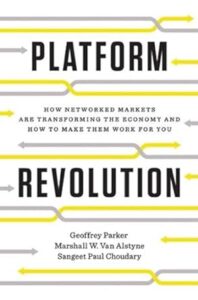 “Platform Revolution: How Networked Markets Are Transforming the Economy and How to Make Them Work for You” by Geoffrey G. Parker, Marshall W. Van Alstyne, and Sangeet Paul Choudary is a book about the power of platform businesses in the modern economy. The authors explain how platforms, like Uber and Airbnb, connect users and create value through network effects. The key takeaway is that understanding and leveraging platform strategies can help businesses innovate, grow, and succeed in today’s interconnected world.
“Platform Revolution: How Networked Markets Are Transforming the Economy and How to Make Them Work for You” by Geoffrey G. Parker, Marshall W. Van Alstyne, and Sangeet Paul Choudary is a book about the power of platform businesses in the modern economy. The authors explain how platforms, like Uber and Airbnb, connect users and create value through network effects. The key takeaway is that understanding and leveraging platform strategies can help businesses innovate, grow, and succeed in today’s interconnected world.
Buy on Bookshop and support your local bookshop
Platform Revolution by Geoffrey G. Parker, Marshall W. Van Alstyne, and Sangeet Paul Choudary radically changed my view on the potential of platform-based business models in e-commerce. The book provides a deep dive into how digital platforms like Uber, Airbnb, and Amazon are reshaping industries by facilitating exchanges between users.
The most impactful takeaway for me was understanding the importance of creating and managing a successful platform that provides value to all participants, fostering a vibrant community around our offerings. This insight prompted me to pivot our e-commerce strategy towards developing a more interactive and community-focused platform, enhancing user engagement and loyalty.
The authors’ analysis on network effects and platform ecosystems has guided me in optimizing our business model to capitalize on the exponential growth and scalability that platforms can offer.
Ian Sells, CEO, Million Dollar Sellers
Embrace Continuous Learning for Sustained Success
The journey of leading a fast-growing tech company is filled with challenges and opportunities that require continuous learning and adaptation. By delving into these 22 best business books, you can gain essential insights, practical strategies, and inspiring lessons to enhance your leadership and drive your company towards sustained success.
Whether it’s refining your company’s culture, innovating your business model, or improving your decision-making skills, these books provide the knowledge and wisdom needed to navigate the ever-evolving tech landscape. Embrace the lessons from these essential reads, and let them guide you in building a resilient, innovative, and thriving organization. Keep reading, keep learning, and keep leading with purpose.
This post was contributed to by members of Powderkeg Executive Councils, the only private membership network designed exclusively for tech companies and executives looking to grow and connect beyond the confines of Silicon Valley. Apply today to join.


